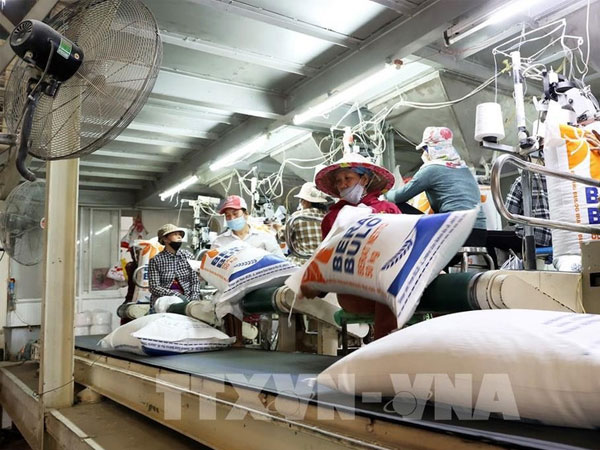 Vietnam’s rice industry has the capacity to maintain export targets, but businesses need to actively expand markets and reduce dependence on a few major partners to build a more sustainable foundation for growth, said Nguyen Anh Son, Director of the Import-Export Department under the Ministry of Industry and Trade.
Vietnam’s rice industry has the capacity to maintain export targets, but businesses need to actively expand markets and reduce dependence on a few major partners to build a more sustainable foundation for growth, said Nguyen Anh Son, Director of the Import-Export Department under the Ministry of Industry and Trade.
Hanoi (VNA) - Vietnam’s rice industry has the capacity to maintain export targets, but businesses need to actively expand markets and reduce dependence on a few major partners to build a more sustainable foundation for growth, said Nguyen Anh Son, Director of the Import-Export Department under the Ministry of Industry and Trade.
Vietnam has already shipped 6.3 million tonnes of rice in the first eight months of this year, indicating the plan to export 8 million tonnes in 2025 is on track, Son told the Vietnam News Agency on the sidelines of a conference to promote rice export in the remaining months of 2025.
Regarding the temporary suspension of rice imports by the Philippines, one of Vietnam’s main buyers, he said businesses should remain calm, continue actively coordinating with partners to ensure delivery schedules, and simultaneously seek alternative markets.
In 60 days, the Philippines will review the situation before deciding whether to reopen imports, giving Vietnam ample time to adjust the export pace, he said.
Eevery challenge carries an opportunity, Son said, stressing that the Philippines’ temporary suspension of rice imports may create some psychological impact on businesses, as it is Vietnam’s largest market. However, he noted that looking at the bigger picture, there is solid reason to believe that the 2025 target remains achievable.
According to Son, beyond the Philippines, Vietnam has been actively expanding into emerging markets with growing demand, from the Middle East, West Asia, and Africa to the EU. These markets are not only promising but also provide "strategic room" for Vietnam’s rice industry to elevate its position and reduce dependence on any single partner. In practice, many businesses have proactively approached these markets early, allowing them to quickly adjust when one market slows without disrupting the export chain.
The MoIT closely monitors market developments and promptly directs Vietnam’s trade offices abroad to update information, connect partners, and expand distribution networks for businesses, he said, adding that the ministry is also working closely with relevant ministries and agencies to implement measures to ensure timely deliveries and maintain the reputation of Vietnamese rice in the international market.
The immediate challenge serves as a test of the rice sector’s resilience while also driving market diversification toward more sustainable exports with higher added value, he said.
Regarding solutions for sustainable rice exports that ensure national food security while contributing to global food security, Son said it is necessary to continue leveraging and fully tapping traditional markets such as China, Japan, and the EU, which serve as stable buyers of Vietnamese rice.
The MoIT regards expansion into emerging markets such as the Middle East, Africa, and South Asia as a strategic priority because these have rising rice import demand, helping Vietnam reduce dependence on a few markets. The signing of a 100,000-tonne rice export agreement with Senegal is a clear example of this strategy, opening promising opportunities for deeper penetration of Vietnamese rice into Africa.
He stated that completing the legal and policy framework to create a favourable business environment is a concrete step to encourage the private sector and small- and medium-sized enterprises to actively join the global rice value chain, in line with the spirit of the Party’s Resolution 68 on developing private economic sector as an important motivation of the economy.
The MoIT places special emphasis on post-market inspection and management, aiming to build a transparent and fair market that encourages healthy competition, eliminates fraudulent practices, and protects the interests of legitimate businesses, he said, adding that the approach helps promote exports, ensure the national food security and supply -demand balance, and maintain social stability./.














© Copyright 2025 The SSResource Media.
All rights reserved.